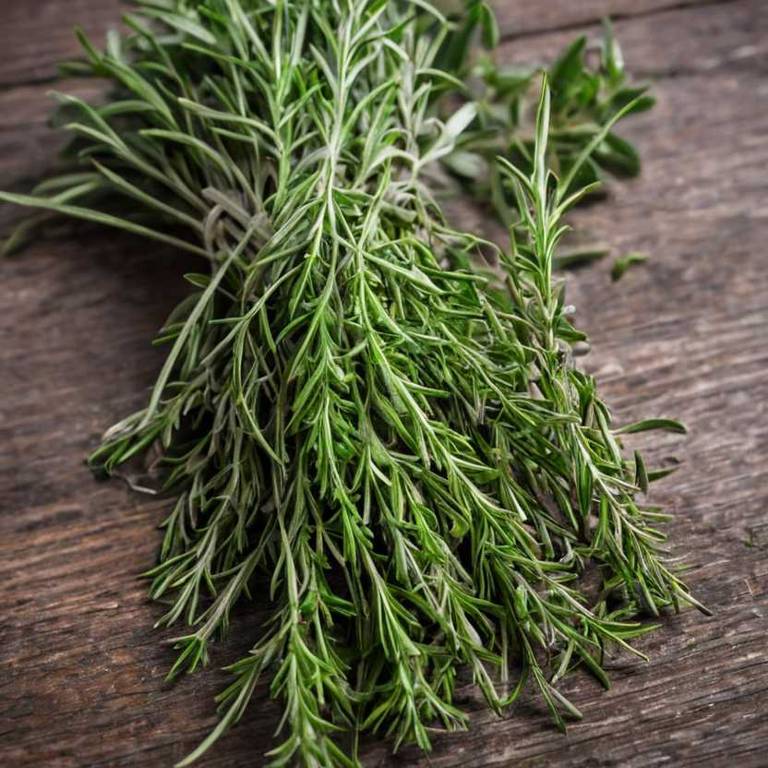By Leen Randell
Updated: Jul 06, 2024
10 Health Benefits Of Rosmarinus Officinalis (Rosemary)

Rosmarinus officinalis, also known as rosemary, has health benefits such as antioxidant, anti-inflammatory, and antimicrobial properties.
These medicinal properties give it the ability to improve cognitive function, memory, and mood. For example, rosemary's ability to improve cognitive function can benefit people with Alzheimer's disease or those who experience memory loss due to age.
Additionally, its anti-inflammatory properties can alleviate symptoms of arthritis and other inflammatory diseases, improving overall quality of life.
This article explains in details the 10 best health benefits of Rosmarinus officinalis.
1. Improves digestion
Rosmarinus officinalis improves digestion because of its carminative and anti-inflammatory properties.
The herb's volatile oils, such as camphor and bornyl acetate, help relax the muscles in the digestive tract, reducing spasms and cramps that can hinder digestion.
Additionally, rosemary's antioxidant and anti-inflammatory compounds may soothe the digestive lining, reducing inflammation and irritation that can contribute to digestive issues like bloating, gas, and irritable bowel syndrome.
2. Reduces inflammation
Rosmarinus officinalis reduces inflammation because it is rich in bioactive compounds such as carnosic acid and rosmarinic acid.
These compounds have potent antioxidant and anti-inflammatory properties that help to inhibit the production of pro-inflammatory enzymes and cytokines.
By reducing inflammation, rosemary extract has been shown to alleviate symptoms associated with conditions such as arthritis, gout, and other inflammatory diseases.
3. Boosts memory and concentration
Rosmarinus officinalis boosts memory and concentration because of its potent antioxidant and cognitive-enhancing properties.
The herb's essential oils, specifically camphor and borneol, have been shown to improve blood flow to the brain, enhancing the delivery of oxygen and nutrients to neural cells.
This increased cerebral circulation leads to improved focus, attention, and memory recall, making rosemary a natural and effective tool for individuals looking to improve their mental acuity and cognitive function.
4. Eases stress and anxiety
Rosmarinus officinalis eases stress and anxiety because it has a profound impact on the brain's chemistry.
The herb's active compounds, including camphor and borneol, have been shown to increase the production of neurotransmitters such as GABA, serotonin, and dopamine, which help regulate mood and reduce feelings of anxiety and stress.
Additionally, rosemary's aroma can stimulate the olfactory system, promoting a sense of calm and relaxation, making it an effective natural remedy for managing stress and anxiety.
5. Relieves pain
Rosmarinus officinalis relieves pain because of its potent analgesic and anti-inflammatory properties.
The herb's active compounds, such as carnosic acid and rosmarinic acid, work to reduce inflammation and ease pain in the body.
Additionally, rosemary has been shown to have a direct impact on the brain's pain receptors, helping to block the transmission of pain signals and provide natural relief from chronic pain conditions.
6. Supports immune system
Rosmarinus officinalis supports immune system because of its high antioxidant and anti-inflammatory properties.
The herb contains carnosic acid and rosmanol, which have been shown to have potent antimicrobial and antiviral effects, helping to protect against infections and diseases.
Additionally, rosemary's ability to modulate the immune response may help to prevent autoimmune disorders and reduce oxidative stress, promoting overall immune function and well-being.
7. Improves blood circulation
Rosmarinus officinalis improves blood circulation because of its ability to dilate blood vessels and increase blood flow.
The herb's essential oils, particularly camphor and bornyl acetate, have a vasodilatory effect, allowing for increased oxygenation and nutrient delivery to tissues.
This improved circulation can help alleviate conditions such as Raynaud's disease, poor circulation, and even mild circulatory issues related to aging.
8. Prevents brain aging
Rosmarinus officinalis prevents brain aging because of its ability to increase blood flow to the brain, which enhances cognitive function and memory.
The herb's antioxidant properties also help protect against oxidative stress, a major contributor to age-related decline in brain health.
Additionally, rosemary has been shown to stimulate the growth of new neurons and promote the clearance of amyloid beta peptides, a hallmark of Alzheimer's disease.
9. Fights cancer cells
Rosmarinus officinalis fights cancer cells because of its rich antioxidant and anti-inflammatory properties.
The herb's carnosic acid has been shown to induce apoptosis, or programmed cell death, in cancer cells while leaving healthy cells intact. Additionally, rosemary's polyphenols have been found to inhibit the growth of new blood vessels that feed tumors, thereby reducing their ability to spread.
This natural compound has demonstrated promise in combating various types of cancer, including breast, lung, and colon cancers.
10. Detoxifies the liver
Rosmarinus officinalis detoxifies the liver because of its potent antioxidant and anti-inflammatory properties.
The herb's active compounds, including camphor and borneol, have been shown to stimulate the production of enzymes that help break down and eliminate toxins from the liver, reducing oxidative stress and inflammation in the process.
This natural cleansing action helps protect the liver from damage and promotes overall health and well-being.